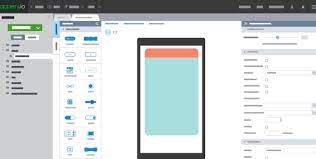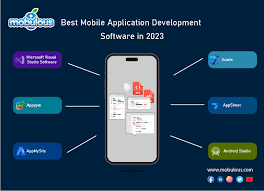Exploring the Latest Trends in Mobile App Development Software
The World of Mobile App Development Software
Mobile applications have become an integral part of our daily lives, offering convenience, entertainment, and efficiency at our fingertips. Behind every successful mobile app is a robust development process supported by innovative app development software.
App development software provides developers with the tools and resources necessary to design, build, test, and deploy mobile applications across various platforms such as iOS and Android. These software solutions streamline the development workflow, enhance collaboration among team members, and ultimately accelerate time-to-market for new apps.
Key Features of Mobile App Development Software:
- Code Editors: Integrated development environments (IDEs) offer powerful code editors with syntax highlighting, auto-completion, and debugging capabilities to facilitate coding.
- User Interface Design Tools: Visual design tools enable developers to create intuitive user interfaces through drag-and-drop functionality and pre-built components.
- Testing & Debugging Tools: Built-in emulators and simulators allow developers to test their apps on different devices and operating systems to ensure optimal performance.
- Version Control Systems: Collaboration features such as version control systems help teams manage code changes efficiently and maintain a cohesive development process.
- Integration with Third-Party Services: Many app development software solutions offer integration with third-party services for features like analytics, push notifications, and in-app purchases.
The Evolution of Mobile App Development:
Over the years, mobile app development software has evolved significantly to meet the growing demands of the industry. From traditional native app development to cross-platform frameworks like React Native and Flutter, developers now have a plethora of tools at their disposal to create innovative mobile experiences.
Cutting-edge technologies such as artificial intelligence (AI), augmented reality (AR), and Internet of Things (IoT) have also influenced the landscape of mobile app development, opening up new possibilities for creating immersive and engaging apps.
In Conclusion
The world of mobile app development software continues to expand as developers push the boundaries of creativity and functionality. By leveraging these advanced tools and technologies, developers can bring their app ideas to life and deliver exceptional experiences to users worldwide.
Essential FAQs: Choosing the Right Software and Tools for Mobile App Development
- What software is required for app development?
- What is the best tool for mobile app development?
- Which programming is best for mobile app development?
- Is mobile app development the same as software development?
- Which software is best for mobile app development?
- What software is used for mobile app development?
What software is required for app development?
When it comes to app development, the essential software required varies depending on the platform and development approach chosen by developers. For native app development targeting iOS, Xcode is a popular choice, while Android Studio is commonly used for Android app development. Cross-platform frameworks like React Native and Flutter have gained popularity, requiring their respective SDKs and tools for development. Additionally, developers often utilize version control systems like Git, integrated development environments (IDEs) such as Visual Studio Code or IntelliJ IDEA, and design tools like Adobe XD or Sketch to create user interfaces. Testing tools like Appium or XCTest are essential for ensuring app quality. Overall, a combination of these software tools is crucial for a seamless app development process across different platforms and devices.
What is the best tool for mobile app development?
When it comes to mobile app development, the question of the best tool is a common one among developers seeking the most efficient and effective solution for their projects. The answer to this question may vary depending on factors such as the specific requirements of the app, target platforms, development team expertise, and budget constraints. Some popular tools for mobile app development include native development kits like Xcode for iOS and Android Studio for Android, cross-platform frameworks such as React Native and Flutter, as well as app development platforms like Xamarin and Appgyver. Ultimately, the best tool for mobile app development is one that aligns with the project goals, developer skills, and desired outcomes to deliver a high-quality app that meets user expectations.
Which programming is best for mobile app development?
When it comes to mobile app development, the choice of programming language often depends on various factors such as the specific requirements of the app, target platform, developer expertise, and project timeline. Some popular programming languages used for mobile app development include Java for Android apps, Swift for iOS apps, and JavaScript frameworks like React Native and Flutter for cross-platform development. Each programming language has its strengths and weaknesses, so selecting the best one ultimately comes down to understanding the project’s needs and selecting the most suitable language that aligns with the development goals.
Is mobile app development the same as software development?
In the realm of technology, the distinction between mobile app development and software development is often a point of inquiry. While both disciplines share fundamental principles of coding, testing, and deployment, mobile app development is a specialized subset of software development tailored specifically for creating applications that run on mobile devices such as smartphones and tablets. Mobile app developers must consider unique factors like device compatibility, user interface design for smaller screens, and platform-specific requirements when compared to traditional software development. Therefore, while mobile app development is a form of software development, it encompasses its own set of considerations and challenges that differentiate it from broader software development practices.
Which software is best for mobile app development?
When it comes to choosing the best software for mobile app development, the answer often depends on various factors such as the specific requirements of the project, the expertise of the development team, and the target platforms for the app. Popular options for mobile app development software include industry-leading tools like Android Studio for Android app development and Xcode for iOS app development. Cross-platform frameworks like React Native and Flutter are also favored for their ability to streamline development across multiple platforms. Ultimately, selecting the best software involves evaluating features, compatibility with project needs, ease of use, and community support to ensure a successful app development process.
What software is used for mobile app development?
In the realm of mobile app development, a common query revolves around the software utilized for creating mobile applications. Developers often rely on a variety of tools and platforms tailored to their specific needs. Popular software for mobile app development includes integrated development environments (IDEs) like Android Studio for Android apps and Xcode for iOS apps. Additionally, cross-platform frameworks such as React Native and Flutter have gained popularity for building apps that can run on multiple platforms. These software solutions offer a range of features, from code editing and debugging to testing and deployment, empowering developers to craft innovative and user-friendly mobile applications efficiently.




